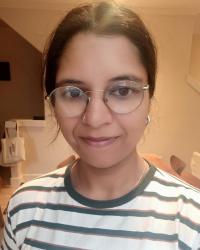
Biography
-
PhD. Human Geography, Queen Mary University of London, 2022
-
MRes. Global Development Futures, Queen Mary University of London, 2018
-
MSc. Globalisation and Development, SOAS, 2014
-
BA. Sociology, University of Nottingham, 2011
Kavita is a feminist researcher of digital technologies and data. Broadly, Kavita's work seeks to uncover the ways in which data-driven digital technologies are enabling new forms of violence and marginality and the potentials for more progressive data futures. Kavita's research has spanned different kinds of data-driven technologies including biometric tech, digital dating apps and gig economy labor platforms.
1) Biometric and Financial Technologies.
Focusing an enquiry on Aadhaar, India's biometric identity system, and India Stack, a software infrastructure build on top of it, Kavita's research has mapped the role of different stakeholder groups (corporate and government) and their motives in creating these big-data systems. She shows how revolving door networks enable the production of these initiatives, which create corporate winners and extend colonial data practices. This research has been published in Area and The Journal of Cultural Economy.
2) Digital Dating Apps
Kavita's PhD research explored the increasing use of digital dating apps (Tinder, Bumble, Hinge, TrulyMadly) among women and gender minorities in Mumbai. This project shows how these platforms' algorithmic systems are designed to maintain class and caste endogamy, which is co-produced by platform users and their dating app practices. In this work Kavita uses the term 'data-bility' as a double entendre to argue that how dateable one is on a dating app, relies on data. This work has been published in Transactions of the Institute of British Geographers.
3) Digital Labour Platforms
Kavita's research on digital labour platforms has spanned multiple geographies. Most recently she worked as a Postdoc on the global Fairwork project at the Oxford Internet Institute, Oxford University. She co-authored a report on Gender and Platform Work: Beyond Techno-Solutionism, which was the first of its kind in illuminating the gendered experiences of digital platform workers. Some of the findings from the report are discussed on the Macrodose podcast.
Research
Selected Research
- Fairwork. Gender and Platform Work: Beyond Techno-solutionism. 2020. Oxford, United Kingdom; Berlin, Germany. Accessible: https://fair.work/wp-content/uploads/sites/17/2023/07/Fairwork-Gender-Report-2023-FINAL-red.pdf
- Dattani K. ‘Spectrally shape-shifting: biometrics, fintech and the corporate-state in India’. Journal of Cultural Economy. 2023. https://doi.org/10.1080/17530350.2023.2176340
- Dattani K. ‘Platform ‘glitch as surprise’: The on-demand domestic work sector in Delhi’s National Capital Region’. City. 2020, 25:3-4 pp. 376-395. https://doi.org/10.1080/13604813.2021.1935786
- Dattani, K. ‘Rethinking Social Reproduction in the Time of COVID-19’. Journal of Australian Political Economy. 2020. No. 85, pp. 51-6. Accessible: https://www.ppesydney.net/content/uploads/2020/06/10_Dattani.pdf
- Dattani K. ‘“Governtrepreneurism” for good governance: The case of Aadhaar and the India Stack’. Area. 2019, 52:2 pp. 1–9. https://doi.org/10.1111/area.12579